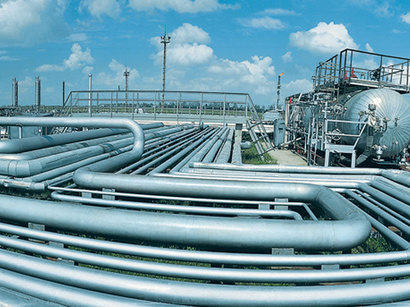Asian gas markets more attractive for Turkmenistan, expert says

By Aynur Karimova
Energy-rich Turkmenistan, which has the fourth largest gas reserves of the world, has been showing great interest in exporting blue fuel both to the consumers of the Old Continent and the emerging Asian markets.
Constantine Levoyannis, the Head of Greek Energy Forum’s Brussels Group, believes that Asian gas markets are more attractive for Ashgabat than European ones in terms of the market conditions, prices and the correlation of supply and demand.
“The economies and populations in the East continue to grow and develop at a faster pace than in Europe, meaning there is simply more demand in Asia as opposed to Europe where we are facing ageing population, economic stagnation and declining gas consumption,” the expert told Trend.
Levoyannis also noted that timing and geostrategic issues such as the return of Iran to energy markets and the security for transit of gas to Europe, particularly on the Turkish border, are also important considerations while evaluating opportunities to export Turkmen gas.
Ashgabat is actively implementing an energy strategy aimed at increasing exports of the blue fuel and diversifying its supply routes to the largest global markets, where the demand for energy resources is growing.
Being one of the key players in the gas market of the Caspian Sea region and Central Asia, Turkmenistan produces about 70-80 billion cubic meters of gas a year. It possesses some 17 trillion cubic meters of natural gas, with some estimates placing that figure upwards of 25 or 26 trillion cubic meters.
Energy-hunger China is one of main destinations where Turkmenistan's blue fuel is delivered. The figures vary between 30-45 billion cubic meters.
Turkmenistan is also the largest supplier of natural gas to Iran. Central Asian nation exports 6-8 billion cubic meters of gas to Iran annually. The most convenient transportation route for Turkmen resources to the energy markets of the region passes through Iran. Tehran and Ashgabat also barter part of the gas supplied from Turkmenistan for goods and services from Iran.
Turkmenistan is also keen on exporting its blue fuel to the South Asian markets, in particular to Pakistan and India. In this regard, the Turkmenistan-Afghanistan-Pakistan-India gas pipeline project, which will extend from Galkynysh field in Turkmenistan, is seen as a tool which would represent an enormous breakthrough for Turkmenistan's capabilities as an international energy player.
Meanwhile, Europe, which endeavors to weaken its dependence on Russia's blue fuel supplies, has recently voiced intention to create new chances for new players.
Levoyannis noted that Europe is interested in Turkmen gas.
Turkmenistan is one of such energy-producing countries, desiring to diversify export routes, and eyeing up a good place in this potential market.
Maros Sefcovic, the European Commission vice-president in charge of Europe’s energy agenda, said in April 2015 that EU expects to receive Turkmen gas already in 2019.
The optimal option to deliver Turkmen blue fuel under the Caspian through Azerbaijan to European consumers would become the long-awaited 300 kilometer-long Trans-Caspian gas pipeline project, the construction of which is of strategic interest to the EU, Turkmenistan and Azerbaijan.
The negotiations between the EU, Azerbaijan, and Turkmenistan on the Trans-Caspian gas pipeline began in September 2011 and accelerated after the Ukraine crisis. When the European Union began to impose sanctions against Russia, Malena Mard, head of the EU delegation to Azerbaijan expressed the EU's interest in the implementation of the pipeline and called the project “a good opportunity to diversify energy supplies.”
The unresolved status of the Caspian Sea, however, has been regarded as the main factor hindering the implementation of the project.
"The project is still wishful thinking at this stage and very far away from the completion, but the obstacles that have hindered the project's progress in the past still remain," said Levoyannis. "Europe continues to pursue the prospect of the Trans-Caspian Pipeline in an attempt to overcome these obstacles, and the EU re-launched talks on the project in 2015."
Speaking about the position of the other Caspian states regarding Tran-Caspian Pipeline, Levoyannis noted that Russia and Iran oppose this project because it will pose challenges of competition in the European gas market.
--
Aynur Karimova is AzerNews’ staff journalist, follow her on Twitter: @Aynur_Karimova
Follow us on Twitter @AzerNewsAz
Here we are to serve you with news right now. It does not cost much, but worth your attention.
Choose to support open, independent, quality journalism and subscribe on a monthly basis.
By subscribing to our online newspaper, you can have full digital access to all news, analysis, and much more.
You can also follow AzerNEWS on Twitter @AzerNewsAz or Facebook @AzerNewsNewspaper
Thank you!
